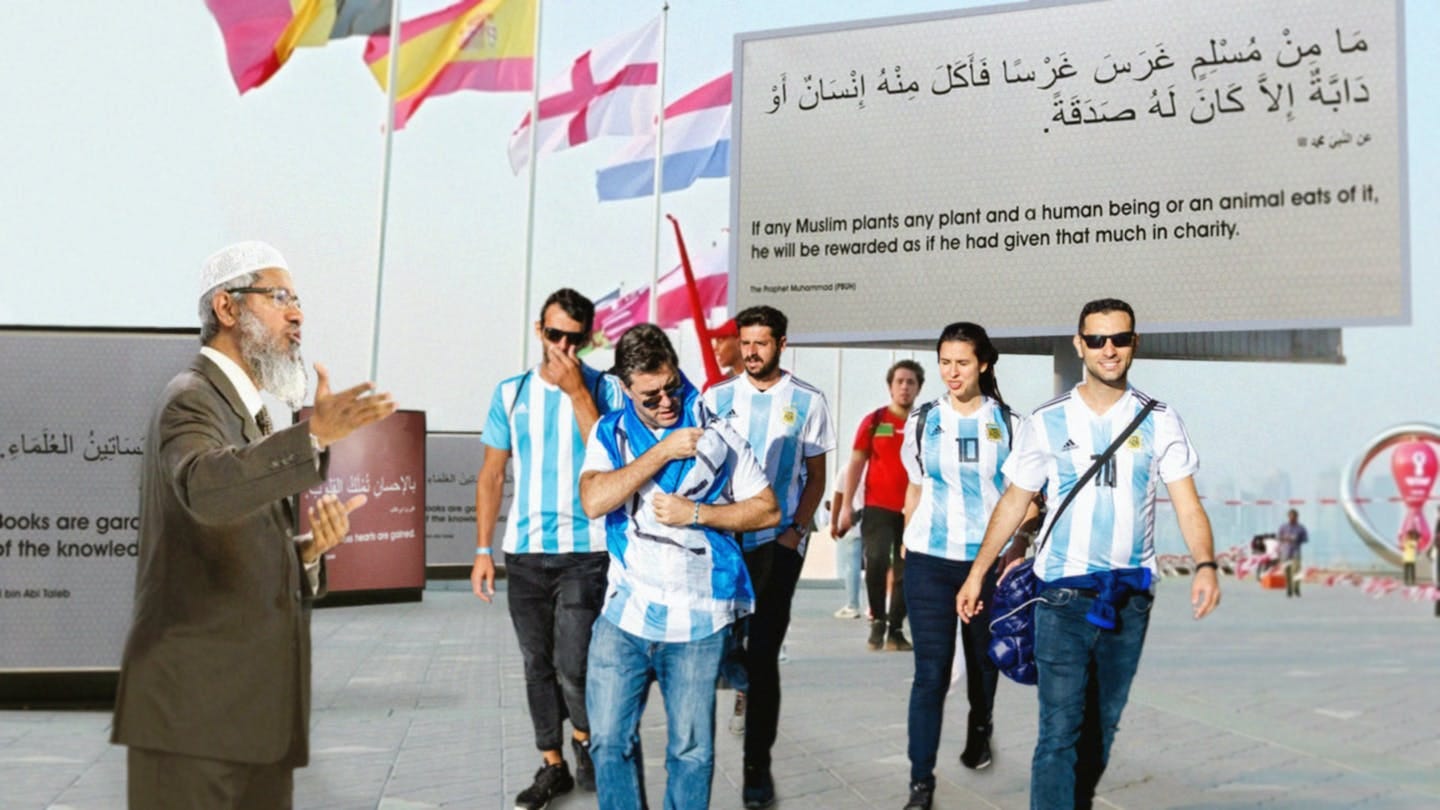The Woke Gay Airplane and Other Pro-Qatar Fake News at the World Cup
Arab media has portrayed Qatar as a proud Muslim state standing up to woke Western hypocrites during the soccer tournament. Some of the stories have gotten out of hand.
The World Cup has become a PR disaster for Qatar in English-language media. Hosting a global sports event put a spotlight on Qatar’s labor regime, lack of LGBT rights, taboos on alcohol, and use of money to spread influence abroad. The small princely state, which many foreigners had not heard of before, has become a byword for techno-feudalism. Several celebrities are boycotting the tournament.
The reaction in the Arab world has been a bit different. Many people are proud of Qatar as the first Arab and Muslim state to host the prestigious soccer tournament. And there has been a strong reaction to the reaction, a belief that “the West” is hypocritically singling out a successful Middle Eastern state.
On social media, Qatar’s defenders have spread false rumors about the state standing up to woke Europeans and converting fans to Islam in droves.
I was honestly surprised by this reaction. There is a strong sense of resentment in the Levant towards the Persian Gulf elites, who are seen as tacky aristocrats with unearned privilege. One of my friends in Amman talks about Gulfie tourists with a torrent of racial slurs, some of them cribbed from American movies. Another insists that “Saudis are not even real Arabs anymore.”
The vast majority of workers in the Gulf petrostates are foreign migrants with no path to citizenship and limited labor rights. Over 6,500 of them have died in Qatar over the past decade, many due to working conditions or under unclear circumstances. Some sloppy news coverage left readers with the impression that all 6,500 died building the World Cup stadium.
But, “Qatar is different,” in the words of two different Jordanian friends. Many viewed Qatar as one of the few petro-monarchies that has used its money to promote authentic values, rather than a culture of tacky foreign knockoffs. And it is not seen as hostile to the Arab masses like the other Gulf states.
I’ve heard some defenses of Qatar from secularists. Doha is seen as more willing to play ball with democracy — or at least less reflexively supportive of authoritarian regimes outside its borders — than the United Arab Emirates and Saudi Arabia. Whatever its flaws, the Qatari-funded channel Al Jazeera was lightyears ahead of other regional media in providing critical coverage that treats its viewers like adults.
Then there’s the Palestinian question. At a time when other Gulf states are rushing to sign defense deals with Israel and even repressing pro-Palestine political activity, Qatar has at least put on appearances in support of Palestinians. The decision to allow Israeli fans to fly to the World Cup has hurt this image a bit, but the viral video of World Cup performer Maluma telling off an Israeli newscaster helped reinforce the idea that Qatar is standing up to foreign hypocrites.
Qatar’s appeal is felt the strongest in religious circles. In the words of one Jordanian, “people think that Saudi Arabia and the UAE are always conspiring against Islam,” while Qatar is using its position to promote Islam in the world.
Other Gulf states have tried very hard to accommodate wealthy foreigners. The United Arab Emirates even changed from the Muslim weekend to the Christian one, a move the government said would help integrate the country with “global markets.”
Qatar, however, is sticking to its guns on conservative social rules and using the World Cup as a venue for proselytizing. The last-minute decision not to offer beer at the World Cup angered soccer fans who were expecting drunk festivities, but many Muslims saw it as putting rowdy foreigners in the place. The ceremonies have included prayer breaks and Islamic promotional materials.
Influencers resurfaced an old video of televangelist Zakir Naik converting audience members to Islam, portraying it as something that happened during the World Cup. Some influencers falsely claimed that 558 fans had converted en masse. A fake account pretending to be Naik upped the ante, claiming that 1,800 fans converted in a single day. A few news blogs picked up the claims.
The Qatari government has responded to concerns about the treatment of LGBT fans — a very real concern in light of reported homophobic abuse by Qatari authorities — by telling visitors to respect the local culture.
Which brings us to the gay airplane rumor.
Several social media pages have spread the story that Qatar refused to welcome a German delegation because their airplane “promoted homosexuality.” Well, the phrase they used was a bit nastier than that.1 According to some versions of the rumor, the delegation was forced to fly to Oman and then come back on another plane.
The posts were accompanied by a picture of a Lufthansa plane with the slogan “diversity wins” and a kitschy social justice cartoon.
The report was false, as official media quickly confirmed. But a Jordanian and Egyptian outlet had already run the story, citing “activists from social media.”
There is an element of cope in the rumor. Sure, even the most sympathetic Gulf state agreed to accept direct flights from Tel Aviv, but at least it stuck it to those Europeans with their woke slogans!
I’ll end with this parody listicle from Alhudood, a satirical Jordanian newspaper. The Arabic equivalent of The Onion, it’s quickly becoming my favorite news source:
Your guide to telling the difference between the World Cup and the Hajj
A strange belief has caught on among modern Muslims that stadium workers martyred themselves building a new Kaaba, to which people can make pilgrimage from every distant pass.2 They rejoiced, shouting “Allahu Akbar” to pierce the ears of the infidels and defeat the evil eye.
Unfortunately, the force behind the event in reality is an infidel institution called “FIFA.” And you cannot change the date of the Hajj, no matter how many bribes Qatar throws at it.
So if you see fans entering Doha in droves3 without the pilgrim’s uniform, do not panic, and do not demand tribute from them. Calm down, these are just soccer fans who came to support their favorite sports teams in a tournament called “the World Cup.”
To avoid confusion, here’s a guide for differentiating between the two biggest sporting events hosted by Islamic states.
One: The World Cup does not include the stoning of Lucifer4
Despite sharpening the zeal of defenders of the faith, and providing them with an opportunity to launch tweets and social media comments at those they believe to be demons, Qatar has unfortunately not provided a physical version of this service at the World Cup.
So if you intend to attend the World Cup, and see the demons Al Jazeera told you about carrying rainbow flags in the street, do not stone them.
Avoid embarrassing the new Caliph of the Muslims, Tamim bin Hamad, by forcing him to throw you in a cell alongside Lucifer himself. It will disappoint the flock to hear their Caliph apologizing to the world and standing in solidarity with gay people in spite of himself, wearing a rainbow cape.
Second: pleasure
The Hajj is a spiritual, enjoyable, and comprehensible experience for the pilgrim who shows up in Mecca knowing in advance what rites he will perform and what he will encounter, without surprises or obstacles.
Cristiano Ronaldo will not greet him at the gates of the Kaaba to preach to him about the message of soccer, tolerance in Portugal, or the need to line up with the rest of the fans.
Just so, the pilgrim can finish up his rituals and then go to Jeddah to enjoy one of the new nightclubs, unlike a soccer fan, who is deprived of even drinking beer.
Third: there are no Israelis on the Hajj
The pilgrimage will not expose you to the embarrassment of going to the World Cup and running into Israelis who came by direct flights to the beacon of Islam and pan-Arabism, where a consulate has been opened specifically to protect them.
So you will not stutter when doing Qatar apologia, and you will not be forced to talk about “political considerations” and the "Truce of Hudaybiyya" again.5
Both the social media posts and the news coverage, such as al-Bawaba’s article, used the word شذوذ shudhūdh. It means something strange or out-of-the-ordinary, and has a homophobic connotation, like the word “queer” used to carry in English until recently.
وَأَذِّن فِى ٱلنَّاسِ بِٱلْحَجِّ يَأْتُوكَ رِجَالًۭا وَعَلَىٰ كُلِّ ضَامِرٍۢ يَأْتِينَ مِن كُلِّ فَجٍّ عَمِيقٍۢ
“So proclaim the Hajj among the people, and they will come on foot and on every lean camel, from every distant pass.” Qur’an 22:27.
إِذَا جَآءَ نَصْرُ ٱللَّهِ وَٱلْفَتْحُ / وَرَأَيْتَ ٱلنَّاسَ يَدْخُلُونَ فِى دِينِ ٱللَّهِ أَفْوَاجًۭا / فَسَبِّحْ بِحَمْدِ رَبِّكَ وَٱسْتَغْفِرْهُ ۚ إِنَّهُۥ كَانَ تَوَّابًۢا
“If God’s help and victory arrives, and you see the people entering the religion of God in droves, then glorify the praises of your Lord and seek His forgiveness, for He is forgiving.” - Qur’an 110:1-3.
In the Islamic tradition, Abraham repudiated Satan’s temptations by throwing rocks at the devil three times. The Hajj includes a reenactment of that event.
The Truce of Hudaybiyya was an agreement between the early Muslim community and its pagan enemies, which allowed Muslim pilgrims to access the Kaaba. Pagans later broke the treaty and attacked Muslims, leading a Muslim army to conquer Mecca. The incident is often cited in Islamist discourse to support the idea of temporary, pragmatic compromises.





